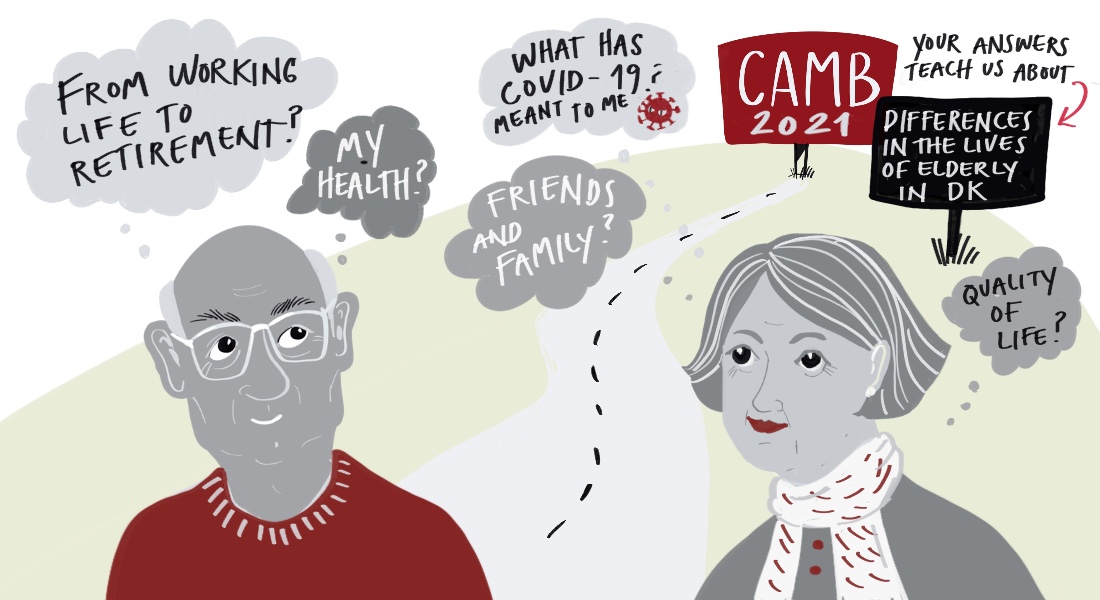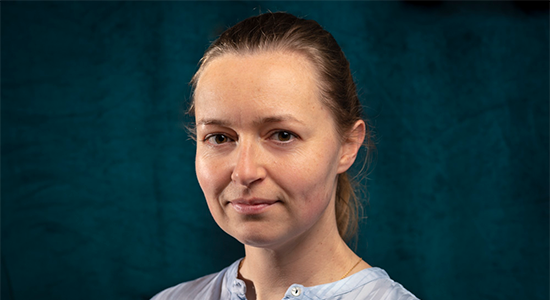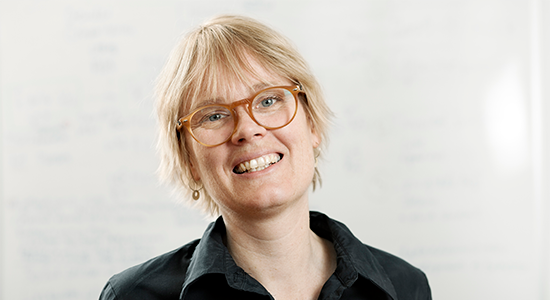Copenhagen Aging and Midlife Biobank (CAMB)
CAMB is a database established to contribute new knowledge on the life course determinants of health and early aging in mid- and late life, designed with particular emphasis on the earlier stages of the aging process.

CAMB is the only Danish Ageing Cohort study following participants (born in 1948-61) across a life span with comprehensive measures of early ageing in midlife and including life course information on a wide range of factors.
CAMB is an independent database collected from 2009 to 2011. In the spring of 2021 new survey data were collected among all original cohort members. The subjects previously participated in earlier established cohort studies with data on the first half of life: Metropolit Project (MP, born 1953), the Copenhagen Perinatal Cohort (CPC, born 1959-1961) or the Danish Longitudinal Study on Work, Unemployment and Health (DALWUH, born 1948–49 and 1958–59). In 2009-11, the participants were invited to a health assessment at the National Research Centre for the Working Environment.
In total, 17,937 cohort members from the Eastern parts of Denmark (aged 49-61 years) were invited to participate in the CAMB 2009-2011 study (MP: 7,750, CPC: 5,282, and DALWUH: 4,906); 7,191 (40%) (4,954 men and 2,234 women) completed a postal questionnaire covering psychosocial, behavioral, health-related and social variables and 5,576 (31%) (3,819 men and 1,754 women) in addition participated in a clinical examination as well as physical and cognitive tests. Non-fasting blood samples were collected and analyzed for low grade inflammation, standard lipid and glucose profiles. From each participant, several samples of plasma, serum, and DNA were stored in a research bio-bank for future use.
In total, 24,133 cohort members (aged 59-73 years) were invited to participate in the CAMB 2021 study; 9,553 (39.58%) (6,244 men and 3,309 women) completed the questionnaire, which follows up on many of the same topics covered in the CAMB survey from 2009-2011 (for further information please see ‘Data’). A total of 4,286 people completed both CAMB questionnaires (2009-2011 and 2021).
Linking CAMB to national registers provide outstanding possibilities to study the importance of pre- and perinatal factors, factors in childhood and early adulthood for early signs of aging in late midlife. As such it serves a unique resource for the study of how the Danish population is ageing and for the identification of factors across the life course that candidates for the prevention of accelerated aging.
The CAMB has been established as a collaboration between Department of Public Health, University of Copenhagen, Center for Clinical Research and Prevention , Frederiksberg Hospital (former:Research Centre for Prevention and Health, Glostrup Hospital) Center for Inflammation and Metabolism, National University Hospital, Copenhagen, Department of Odontology, University of Copenhagen and the National Research Centre for the Working Environment, Copenhagen.
CAMB 2021
The questionnaire follows up on many of the same topics covered in the CAMB-survey from 2009-2011, namely questions about physical health, well-being, early sign of disability, oral health status, work-ability, vocational education, labor market attachment, social relations, health behavior, sleep, life events and measures of mental health. Questions about living conditions, indoor climate, menopause, sexual life, drug use, diet, hostility and self-rated social position were left out and questions regarding health literacy, anxiety, fertility, family formation, fatigue as an early marker of disability, falls, retirement and early pension, volunteer work, night work, hearing and vision impairment, early markers of cognitive function, caregiving and caregiving stress, quality of life and covid-19 were added in the 2021 survey. As participants were slowly moving into late midlife a special emphasis were given to questions about the transition to retirement including pension considerations and previous and present labor market attachment.
CAMB 2009-2011
Clinical Examinations
The clinical examinations included measurements of height, weight, waist measurements, fat percentage, blood pressure, spirometry (lung function test), muscle strength, maximal muscle force, flexibility in lower back, functional test (chair rise, balance test). Aerobic capacity was measured in a subsample
Questionnaire
The questionnaire included questions about health, use of medicine, early signs of disability, fatigue, socioeconomic status, work-ability, work life history, social relations, social capital, health behavior, sleep, life events, and indoor climate. Measures of mental health included questions on depression, hostility, personality, mental distress and psychopathological symptoms and Schizotypical Personality Disorder in a subsample.
Blood tests
The analysed blood tests include data on hemoglobin, blood sugar, HbA1c, total cholesterol, fractioned lipid profile, and hsCRP, and cytokines in the blood, acute phase proteins, other proteins in the blood and polymorphisms in inflammatory genes. The specific low-grade inflammation markers include TNF-alfa, IL-1beta, IL-18, IL-6, IFN-gamma, IL-10 and IL-1 auto antibodies. The remaining blood has been stored in a research biobank for future research projects
Cognitive function
Cognitive function was assessed with the Intelligenz-Struktur-Test (I-S-T 200R).
Oral health
Data on oral health was obtained by a dental examination and items from the questionnaire.
List of variables
A list of variables can be sent by request to data manager Drude Molbo, drmo@sund.ku.dk or project coordinator Bodil Marie Holst, bodil.holst@sund.ku.dk
The steering committee of CAMB welcomes collaboration and the interest of national and international colleagues.
Researchers who want to use data from CAMB or conduct new studies of CAMB subjects based on the CAMB database must send a preliminary request to the PI of CAMB Rikke Lund, rilu@sund.ku.dk with cc to the research programme coordinator Bodil Marie Holst, bodil.holst@sund.ku.dk.
If accepted, the researchers must, as stated above, submit an application which includes the ‘Collaboration Agreement form’, a list of variables and a short research protocol. The research protocol must include the following:
- Title of project
- Background (including relevant references)
- Aim
- Exact description of the data needed
- CAMB data and previous data, if required
- Identifiable +/- biological material
- Selection of subject
- Register dat - Description of biological material (type, amount) – if relevant
- Description of the acquisition of new data including biological material and register data- if relevant
- Plan for analyses. If the project includes analyses of biological material, a detailed protocol must be submitted of the parameters to be analysed, the methods to be used and how much material will be used. In the collaboration agreement, the principal investigator of the project must commit to returning excess biological material to CAMB. Similarly, new data generated from biological material or new derived variables, must be submitted to the CAMB database. Such data may be incorporated in the database and made available to other users.
The project must comply with the protocol, and new studies based on the data acquired and/or biological material may not proceed without the permission of the CAMB steering committee.
(Projects that wish to analyse biological material or obtain register data, which CAMB does not already have permissions for, must obtain the necessary permissions. In this connection, it is requested that specific permission is obtained to return the new data to the CAMB database or the Folkesundhedsdatabasen.
Cross sectional studies shows
Socioeconomic position and ageing:
- a strong social gradient in all measures of physical capability, allostatic load and cognitive ability among both men and women, suggesting a potentially socially graded accelerated ageing
- a strong social gradient in mental distress and depressive symptoms
Social relations and ageing:
- no association between loneliness and measures of physical capability
- higher levels of low grade inflammation in those living alone, but no variation across other measures of social relations (preliminary results)
Inflammation and health:
- that the higher the cardiorespiratory fitness the lower the scores on metabolic syndrome factors. Obesity and low grade inflammation levels explained part of this association
- that IL-1α-specific autoantibodies co-exist with depression/anxiety and risk factors of cardiovascular disease in men, but not women (preliminary results)
Vitality:
- that self‐reported persistent low vitality is not associated with specific aspects of mitochondrial oxidative phosphorylation capacity in peripheral blood, but is associated with DNA damage, BMI and objectively measured physical performance (subpopulation)
Publications on the main themes in cross sectional studies:
- Socio-economic position and physical performance, allostatic load, depression (Hansen et al. 2014a, 2014b, Wimmelman et al. 2017, Lindved Petersen 2017)
- Cognition demographic variation (Mortensen et al. 2014)
- Personality demographic variation (Mortensen et al. 2014)
- Vitality (Maynard et al. 2013 and 2015)
- Social relations/loneliness and physical capability/inflammation (Lund et al. 2018 and 2016)
- Low grade inflammation and health (Weddel-Neergaard A et al. 2018, Bruunsgaard et al. submitted 2018)
Life course studies shows
Socioeconomic position and ageing:
- that young adult cognitive function explains a substantial part of the social gradient in cognitive function. But that especially the indirect effect of the early social environment and the direct effect of occupational complexity may influence later life individual differences in cognitive ability
- that increasing number of income drops across 20 years are associated with higher levels of low grade inflammation (preliminary results)
- that 4+ years lived below 60% of the national median income across 22 years is modestly associated with adverse midlife ageing outcomes (poorer physical capability, cognitive function and higher inflammatory levels) (preliminary results)
Occupational physical activity:
- that a history of physical exposures at work was associated with only minor variation in physical capability in midlife
- that cumulated hard physical work throughout life predicted risk of long-term sickness absence among older workers
Intelligence:
- that early life factors (low birth weight, low SEP and lower intelligence) increase the risk of psychiatric diseases, in particular alcohol abuse which was also most strongly associated with inflammatory biomarkers and poor survival
- that higher intelligence in young adulthood is closely related to better physical performance and survival in midlife
- that higher birth weight was significantly associated with higher intelligence at age 19, 28 and 50. Not a weaker association at age 50. Exception for the highest BW
Stress and major life events:
- that exposure to the accumulation of prenatal and early life stressors, is associated with higher levels of CRP and IL-6 in later life
- that the experience of stressful events and circumstances in both early life and adulthood independently predicted higher allostatic load
- that stressful events in childhood are associated with shorter telomere length in middle-aged men and that part of this relation is explained by depressive mood and low grade inflammation.
Decline in cognition:
- Task induced deactivation of brains default mode network (Hansen et al. 2014)
- Resting cerebral blood flow (reduced perfusion in the precuneus and posterior cingulate gyrus) (Henriksen et al. 2017)
- Higher cellular levels of deoxyribonucleotides (Desler et al. 2015)
- Poor sleep quality (Waller et al. 2014)
- Reduced nocturnal melatonin response at 4 am (Waller et al. 2016)
Body size:
- that high maternal BMI, high ‘BMI’ at birth and in early adulthood is associated with higher levels of inflammation
- that BMI tracking was weaker at late adult ages than at young adult ages. Although BMI tracks across the life course, childhood BMI is relatively poor at identifying later adult overweight or obesity
Infertility:
- that male factor infertility might be associated with an increased level of interleukin-6
Publications on the main themes in life course studies:
- Socio-economic position and early ageing (physical and cognitive function, inflammation), and mental health (Foverskov et al. 2017, Petersen et al. submitted 2018, Pedersen et al. submitted 2018, Osler et al. 2013, 2015a, 2015b)
- Occupational physical activity and midlife physical capability (Møller et al. 2013, 2015, Sundstrup et al. 2017a,b, 2018)
- Intelligence and birth weight, physical performance, mortality (Flensborg Madsen et al. 2017, Meincke et al. 2014, 2016 a,b)
- Body size and inflammation, change in BMI (Pedersen et al. 2016, Aarestrup et al. 2016)
- Infertility and inflammation (Hærvig et al. 2018)
- Major life events/stress and inflammation, allostatic load, telomere length (Dich et al. 2015, Osler et al. 2016, Pedersen et al. 2017)
The unique research infrastructure provides possibilities for numerous future projects based on the existing data including the register linkage. There is also great potential in the extended use of the biological material of the Biobank
It is a top priority for the steering committee to obtain funding for another clinical examination round, now while the participants are moving into retirement.
The possibility to include the cohort members children for cross generational studies is also of great scientific value.
The Copenhagen Aging and Midlife Biobank was funded by generous grants from the VELUX FOUNDATION (VELUX26145 and 31539).

The authors thank the staff at Department of Public Health and National Research Centre for the Working Environment, who undertook the data collection.
Further thanks to Kirsten Avlund†, Helle Bruunsgaard, Nils-Erik Fiehn, Åse Marie Hansen, Poul Holm-Pedersen, Rikke Lund, Erik Lykke Mortensen and Merete Osler, who initiated and established the Copenhagen Aging and Midlife Biobank from 2009-2011. The authors acknowledge the crucial role of the initiators and steering groups of the Metropolit Cohort, The Copenhagen Perinatal Cohort and The Danish Longitudinal Study on Work, Unemployment and Health
Group Leader
Rikke Lund
Professor
Email: rilu@sund.ku.dk
Phone: +45 35327992

CO-PI
Charlotte Juul Nilsson
Associate professor
Email: cjni@sund.ku.dk
Phone: +45 35 32 71 22
Project Coordinator
Bodil Marie Holst
Email: bodil.holst@sund.ku.dk
Phone: +45 35332978
Data administrator
Drude Molbo
Email: drmo@sund.ku.dk
Phone: +45 35326736
Steering committee
- Professor Rikke Lund, MD, DMSc, PhD, (Principal Investigator (PI) of CAMB), Section of Social Medicine, Department of Public Health, University of Copenhagen
(DALWUH) - Global Medical Director Helle Bruunsgaard, MD, PhD, DMSc,
- Cell Therapy/Parkinson's Disease,
701 Global Medical Affairs RED & Cell Therapy, Novo Nordisk - Associate Professor Esben Boeskov Øzhayat, DDS, PhD,
Department of Odontology, University of Copenhagen - Professor Anne Helene Garde, MSc, PhD
Section of Social Medicine, Department of Public Health, University of Copenhagen and
The National Research Centre for the Working Environment - Professor Trine Flensborg-Madsen, PhD, DMSc
National Institute of Public Health, University of Southern Denmark
(CPC) - Associate Professor Charlotte Juul Nilsson, MD, PhD,
Section of Social Medicine, Department of Public Health, University of Copenhagen - Professor, Consultant Merete Osler, MD, DMSc, PhD,
Center for Clinical Research and Prevention, Frederiksberg Hospital and Section of Epidemiology, Department of Public Health, University of Copenhagen (MP) - Professor Karsten Vrangbæk, MSc in Political Science, MA econ, PhD
Section of Health Services Research, Department of Public Health, University of Copenhagen

